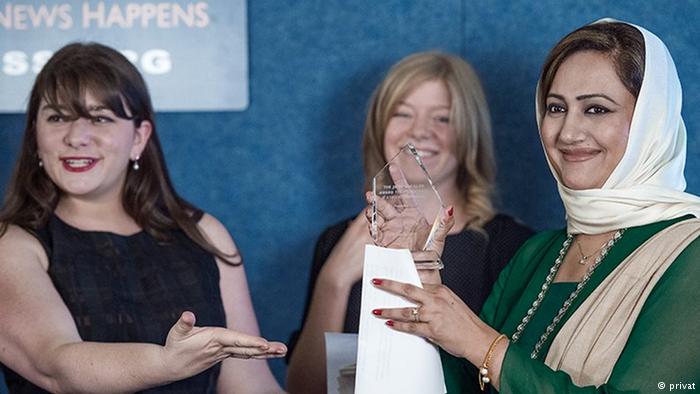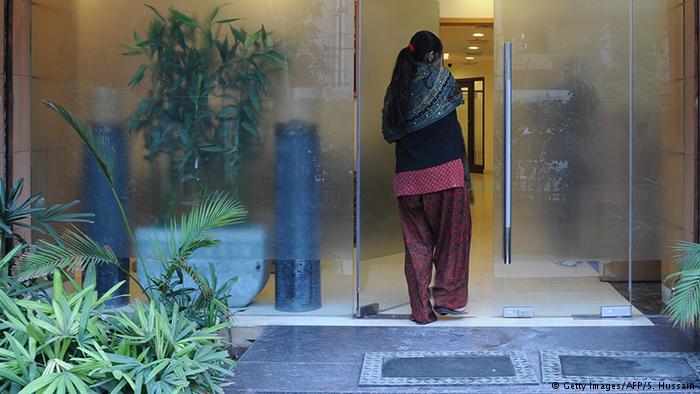Online harassment against women journalists continue

Asma Shirazi (right), renowned Pakistani TV journalist, has won many international awards.
Pakistani Journalist Asma Shirazi became a target of harsh online harassment after interviewing the former prime minister of Pakistan Nawaz Sharif. She defended herself bravely.
Shirazi traveled with former Pakistan Prime Minister Nawaz Sharif and his daughter Maryam Nawaz from London to Pakistan. Both father and daughter were recently sentenced to 11 and 8 years respectively by the accountability court in Islamabad. Shirazi was not alone. She was travelling with over 10 other journalists who wanted to cover this important trip, which was taking an important party leader back to Pakistan to serve jail time. Just before the flight set off, Asma tweeted that she had recorded an exclusive interview with Nawaz Sharif but her program was not allowed to be broadcasted. Later on, during the stayover in Abu Dhabi, she and other journalists did a phone interview with Sharif.
All of this triggered some harsh online trolling. Shirazi was targeted by followers of PML N’s rival political party Pakistan Tehreek e Insaf and also pro-establishment online users. She was called a “whore”, a “slut”, a “traitor” and a “western agent”. She faced the comments bravely and even responded to some of them. She received widespread support not only from female colleagues but from male journalists too. Faizan Lakhani, a sports journalist with Geo News made the following statement to DW: “Our society has become intolerant and negative; we are not ready to accept dissent. Not only female but male journalists are being attacked. In the past, many female journalists have been targeted. Democracy is about patience and tolerance unfortunately our political leaders are also not preaching their followers to be tolerant.”
“Journalists are with Asma Shirazi,” he added. “I hope the political leadership takes notice of this. No journalist should go through this. Shirazi is a journalist and tomorrow she might be reporting the rival political party; a journalist is neutral and she or he should not be targeted for doing their work.”
On her Twitter account, the journalist Marvi Sirmed wrote: “Standing with you in solidarity. The smear campaign against you is part of a certain party, supported by one certain institution, both of which thrive on bullying, arm twisting, abuse and libel. This is how they try to bend media in their favor. You stay strong girl.” The journalist Meher Bokhari tweeted: “Unpardonable trolling of a fellow colleague. We deal with enough on a daily basis to have to face unjustifiable harassment in the line of duty. People forget ours is a thankless job of having to present both sides of a situation.” From across the border, the Indian journalist, Shekhar Gupta also offered his support, tweeting: “Just in case you thought social media is used to demonize inconvenient journalists only in India: here, a quick look at how brave & celebrated Pakistani news anchor @asmashirazi is being targeted. That’s after censorship killed her interview with Nawaz Sharif in Dubai.”
The Pakistani chapter of the Coalition for Women in Journalism, an independent body formed to provide protection to women journalists, also issued a statement in support of Shirazi. “In some instances, we have documented trolls copy and pasting faces of female journalists on sexually explicit images, at times pornographic images. There have been several threats of ‘murder’ and ‘rape’, specifically targeting women journalists. Overall we notice women journalists being demonized and humiliated with great intensity.”
“The patriarchal mindset still exists in Pakistan,” veteran Pakistani journalist Afia Salam told DW. “And some cannot tolerate independent and successful women. That’s why some of the powerful and successful women are attacked. Women will not be criticized for their work but rather for her character and morality.”
Shirazi faced the trolling bravely, but some women unfortunately do not have the same network of support. What should they do? Afia Salam’s view is that women have to pressure society into judging them for their work and not for their gender.
Author: Beenish Javed (act)
Beenish Javed works as Editor in DW Urdu. She can be reached on Twitter @beenishjaved






